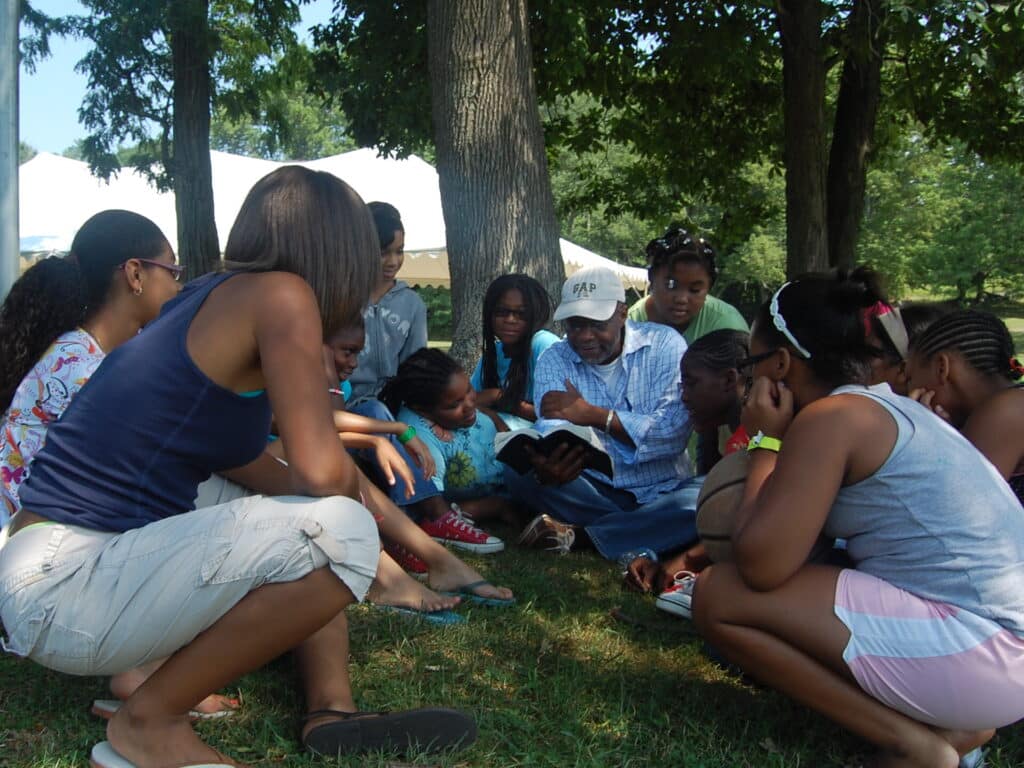Reflections on First Mennonite Gathering at Camp after 9/11
The September 2001 convention of New York City Mennonite churches at Camp Deerpark happened less than two weeks after the 9/11 attacks on the World Trade Center. As we drove up the long hill to camp, we saw the familiar greens and golds and reds of changing leaves emerging from the fog, which had obscured the mountains for much of our trip. The big tent off to the left of the driveway above the chapel held promises of a day of intergenerational, multilingual singing, praying, preaching and catching up with dear sisters and brothers from across our 16 congregations.
The theme for the convention, planned many months earlier, was from the account in Isaiah 6 describing the call of the prophet to speak to God’s people: “Whom shall I send? Who will go for me?” Isaiah responded, “Here am I. Send me.”
Meanwhile, clouds of dust and smoke were still emerging from the enormous tonnage of rubble at Ground Zero caused by the violent action of young men answering a similar call from their particular political/religious leaders in a very different setting.
Back home in the city, despair and calamity surrounded us. All of our congregations were experiencing the effects rippling out from Ground Zero. Some of us had lost friends and family. Some had lost employment and housing. Many were seeing incidents of violence in our neighborhoods toward Muslims and people who looked like Muslims. All of us were hearing hostile, threatening responses from many of our neighbors and our local and national political, civic and religious leaders.
Convention keynote speaker Michael Banks reminded us of God’s compelling call to Isaiah in the context of 9/11: “Whom shall I send? Who will go for me?” He proclaimed the nonviolent, proactive peacemaking and justice-seeking way of Jesus as our model for action. He reminded us that as Anabaptists we were called to be people of God’s peace. And so we listened and talked with each other about how we could be agents of peace in a time of trauma and turbulence. In that conversation, we found our language as a group. We believed that our city and our communities needed a real-time response of faith that was informed and governed by peace. We found the voice of love, healing and reconciliation.
Mennonite Disaster Service (MDS) had already sent Joe Steiner, a social work professor from Rochester, to offer his skills as a community mental health worker among our people. At the convention at Deerpark, he explored setting up an MDS office in New York City to coordinate offers of aid pouring in from all over the U.S. and Canada. From those initial conversations emerged the Restoring Hope Project, which provided $400,000 to support peace-building initiatives in our congregations and many hours of service by volunteers from Canada and the U.S. An array of congregation-based projects were funded, such as: upgrading facilities to enhance community outreach; starting peace-oriented afterschool programs; connecting U.S. churches with Iraqi artists exiled in Damascus, Syria; and hosting a citywide inter-Menno concert with Hesston College. Camp Deerpark hosted our city children and Bluffton College’s peace center for a Saturday of art-making activities focused on peace.
Almost 20 years later, Michael Banks reflected on the significance of that day at Camp Deerpark:
I am grateful that as New York City Mennonites, we had Camp Deerpark as a place where we had already experienced hearing from God—a safe place, a city of refuge, a sacred space. The mantra of American culture was powerful. We didn’t want to lay blame on America, but rather speak to what happens when the church doesn’t address injustice. The issues were complex and there was much we couldn’t do amid the despair and calamity all around us. Being at camp that day kept us from being shattered and at the same time enabled us to define our role as agents of community-oriented healing and reconciliation. Because we were in a safe place, we could look back toward the city and ahead to the challenges awaiting us.
The convention program ended with “Thuma Mina,” a Swahili song whose stanzas in English are, “Send me, Jesus. Lead me, Jesus. Fill me, Jesus. ”On our way down the hill through emerging sunshine and back home to New York City, we carried with us the echoes of the sermon and scriptures and songs and conversations, resonating with confidence that God’s Spirit was sending us as agents of healing and hope, as messengers of peace, as Mennonites committed to the nonviolent way of Jesus. Our time together at Deerpark, in nature so many miles away from the destruction at Ground Zero, renewed our spirits for whatever might lie ahead.
—Written by Ruth Wenger, pastor of North Bronx Mennonite Church.
Michael Banks, former pastor of King of Glory Tabernacle in the Bronx.
Related Entries
Share:
“How Do I Donate?”
Recently, a thirteen-year-old guest at Camp asked Operations Director Kevin Smith, “how do I donate?” Kevin was honestly a little surprised, but was happy to see this young member – who was on retreat with one of our owning churches — taking some initiative. Kevin directed him to the website Donate page, and the young…
The Discipleship Down-Low
Defining Discipleship 18 And Jesus came and said to them, “All authority in heaven and on earth has been given to me. 19 Go therefore and make disciples of all nations, baptizing them in the name of the Father and of the Son and of the Holy Spirit, 20 teaching them to observe all that I have commanded…
The Virtuous Wife
This past weekend, Camp hosted three women’s retreats at Camp. Though the retreat groups were very diverse in background – one was from an urban church plant in Philadelphia, one was from a Garifuna Mennonite church in Brooklyn (an Afro-Caribbean Culture), and one was from a multi-ethnic faith community reaching out in North Jersey. Though…
A Life of Service
I believe the most important thing to God is not our personality, knowledge, or talents, but our availability. How willing and ready are we to respond when He calls, and how ready are we to do what He says? What use to the Lord are people who could do what he wants with excellence and…
Building Belonging
At our February NYC LMC District meeting, we’re discussing the Belonging phase of The Journey Map. In this first phase on the map, individuals and groups on a spiritual journey begin the process of connecting to each other and evaluating the place they may have in each other’s lives. Have you ever been an outsider…
What Are You Tapped Into?
Yesterday we began tapping maple trees, officially opening maple syrup making season at Camp Deerpark! Last year, the transition kept us from producing syrup, so it feels great to be back to it. Starting off, however, has been a bit of a challenge since things are pretty arctic around here. The entire ground is covered…
What Does it Mean to be Spirit-Led with Pastor Mark Perri
One small contribution I can make is to share story with you. This could be valuable in several ways: First, I’m coming to the Mennonites from the outside — from non-denominational GenX “simple/ organic/ emergent church“. Sometimes people coming from outside-in have a helpful perspective for those trying to move from inside-out. Second, as an…
2025 NYC LMC District Call Schedule
Mark these dates in your calendar if you’re part of the NYC LMC District and want to attend the English-language fellowship and resourcing calls led by Bishop Hyacinth Stevens: January 27th – 6:30 PM February 24th – 6:30 PM March 31st – 6:30 PM April 28th – 6:30 PM May 19th – 6:30 PM June 30th…
Winter: Life Under the Surface
On the surface, winter with its cracking and cold seems like the enemy of life. Everything sleeps as though dead, and Camp — quiet and empty — sits waiting. But under the surface, winter is revealed to be a friend to life, not an enemy. In the deep frost, God opens the soil for Spring’s…
Peace Making Presents
This is Session 4 of the Prince of Peace: Jesus and Peacebuilding from the Election to the Holidays webinar series. Advent celebrates the central fact that God began building peace with us by giving a Gift. Following this example, gifts are a powerful tool for peacebuilding in our lives, relationships, and organizations. We’ll explore how…



